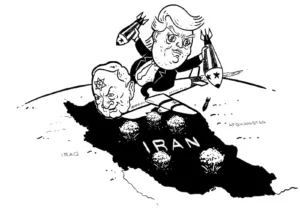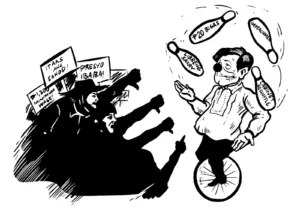By Professor Jose Maria Sison
Founding Chairman, Kabataang Makabayan
Thank you for inviting me to speak on the policy of "neoliberal" globalization and the worsening economic crisis in the Philippines on the occasion of the 31st anniversary of the founding of the League of Filipino Students (LFS). I congratulate the LFS in Baguio City for its achievements. I appreciate the cooperation of the LFS with the Anakbayan, UP Baguio-University Student Council, the Nationalist Corps and the Politically Inclined Students in bringing about this important forum.
"Neoliberal" globalization
First of all, let me explain what the policy of "neoliberal" globalization is all about. It is a policy of deception, misrepresenting monopoly capitalism as "free market" capitalism. It has been adopted since 1980 supposedly to solve the problem of stagflation, the phenomenon of stagnation and inflation going together and the vicious cycle whereby the attempt to solve either one of them aggravates the other.
In pushing the policy, Reagan and Thatcher identified Keynesian and social democratic state intervention as the root cause of stagflation for generating wage inflation and "excessive" social spending. They therefore espoused giving full play to the "free market" and giving the monopoly bourgeoisie and the giant corporations all the opportunities to raise capital resources, make profits without restrictions and get big tax cuts supposedly to develop the economy, generate jobs and make the working people less "dependent" on government.
To achieve the "neoliberal" or "free market" objective, the imperialist states headed by the US have launched an unrelenting attack on the hard won rights of the working class to job security, trade union organization and social benefits. Wage levels have been pushed down. Full-time regular jobs have been replaced to a great extent by part-time jobs. Indirect wages as may be in the form of social insurance, medical insurance, educational benefits and social services have been cut back or cut off. The real incomes of the working class have relentlessly fallen.
However, the "neoliberal" policy has given the multinational banks and firms of the monopoly bourgeoisie all the opportunities to accumulate capital and reap profits through the liberalization of investments and trade, the privatization of state functions and assets, the deregulation at the expense of the working people, women, children and the environment and the denationalization of the economies of underdeveloped countries.
According to the "neoliberals" or "free marketeers", it is wrong to use the direct hand of the state for pursuing economic development and ensuring social welfare. But it is perfectly correct to hand out state resources, state contracts, subsidies, investment insurance and tax exemptions to the giant corporations and likewise to engage in accelerated military spending. No to social welfare but yes to corporate welfare. No to social spending but yes to military spending.
The "neoliberals" have missed the essential point about the problem of stagflation. When it arose in the 1970s, it was because Germany and Japan, which had been ruined in World War II, had reconstructed under the Marshall plan and all imperialist powers were once more caught up in a serious crisis of overproduction as a result of competition and profit-making at the expense of the workers. All capitalist economies were pressing down the wage levels in order to maximize profits and counter the falling rate of profits in the course of expanding production. At the same time, the US led the way in undertaking inflationary activities, including the profuse flow of US dollars abroad, the global deployment of US military forces and the war of aggression in Indochina.
The crisis of overproduction is consistently at the base of the crisis of the US and world capitalist system. By pushing down wages to maximize profits, the monopoly bourgeoisie unwittingly contracts the market for the products of expanding production. The crisis of overproduction becomes conspicuous when large stocks of goods cannot be sold, production has to be cut down and workers are laid off.
From decade to decade, since the late 1960s, the crisis of overproduction has become worse, with the problems of unemployment and inflation becoming more sticky and the growth rates actually stagnant. But since the official adoption of the "neoliberal" policy, the trick to conceal the economic problems has been to increase the money supply and make credit easy for the giant corporations and for the consumers in the huge American market. As a result, we now see a gigantic financial crisis generated by the US.
The US has lived off the people of the world by abusing confidence in the US dollar as global currency. It has gone into industrial decline by heavily importing consumer goods from East Asia. It has incurred trade deficits and has become the world's biggest debtor. It has also gone into heavy budgetary deficits and domestic debt by rapidly increasing expenditures for military production contracts and global deployment of military forces, especially in Iraq and Afghanistan.
It is not only the US federal government that is heavily indebted but also the giant corporations and households. All of them are unable to pay their debts and are the major factor in the current financial crisis afflicting not only the US economy but the entire world economy. Twice have the US households been victimized in a big way since 1995 through credit and financial manipulations.
First, fund managers invested the pension funds of US workers on the hightech bubble which lasted until it burst in 2000. US households were enticed to purchase stocks on margin. At least 40 per cent of them did so. Subsequently, in a more sweeping way, US households were encouraged to buy on credit into the housing bubble which began to burst in 2006. The "neoliberal" policy makers and managers of the US economy had devised the housing bubble to provide US households an artificial source of further credit for consumption, keeping up their role as the biggest consumer market of the world despite the decline of industry and regular employment in the US.
But the US mortgage meltdown, which has become conspicuous since last year, has exposed not only the wobbly US financial system but also the financial plague the US had spread all over the world. The US banks and hedge funds, in concert with the Fannie May (Federal National Mortgage Association) and Freddie Mac (Federal Home Loan Mortgage Association), the two biggest state-backed mortgage banks, had repackaged the bad mortgages into collateralized mortgage debts and asset-backed securities and sold them to the biggest banks in various countries. Not only is the mortgage meltdown exposed but the whole range of economic and financial crisis in the US and in the world.
The current financial crisis, which is the worst since the Great Depression, has resulted in the tightening of credit, economic recession in the imperialist countries and depression on a world scale. The underdeveloped countries are victimized by the tightening of credit and decreased orders from the imperialist countries for raw materials and semi-manufactures.
Despite global economic depression, some sectors in imperialist countries have found ways of raking in superprofits and conjuring the illusion of positive growth rates in imperialist countries and even on a global scale. They are the giant corporations in fuel and food, which are the most basic necessities of all countries. They are inflicting terrible and intolerable suffering on the people of the world, especially those in the underdeveloped countries.








